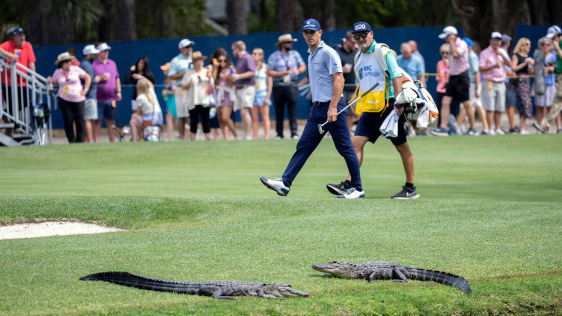Watch an alligator attack its trainer in Utah 1:18
(CNN) --
Jeffrey Heim woke up on May 30, 2021 with one thing on his mind: sharks.
Specifically, shark teeth.
They are his passion and his business.
A failed attempt the day before to find any only fueled his obsession with finding them on his next outing, he told CNN Travel recently.
So, on a hot, sunny Sunday in Sarasota County, Florida, Heim, 25, headed to a spot on the Myakka River about 45 minutes from the Gulf of Mexico.
He had been there numerous times and was comfortable diving into its murky waters to find extinct megalodon teeth in the river bed.
He put on his wetsuit, mask, fins and snorkel and entered the water from the shore, not far from a riverside restaurant.
Heim slipped below the surface.
It hadn't been more than a minute before he felt something.
Something bad.
advertising
"I didn't hear anything, I didn't see anything. I felt like a blunt force object, like someone...swinging a baseball bat and hitting my head. But mostly what I felt was what I thought was a huge boat just hitting against me and pulling me down.
To his surprise, it was not a ship.
He was in the water, alone and face to face with an alligator.
Alligator Attacks: Rare but Fascinating
Alligators bask in the sun in Florida City, Miami-Dade County.
Every county in Florida has alligators.
(Luca Nichetti/Eye Em/Getty Images)
Heim found himself in a situation that many people probably fear, but very few experience: an alligator attack.
There are an estimated 5 million wild American alligators spread across 10 southeastern states and beyond, including parts of North Carolina and even far southeastern Oklahoma.
Louisiana has about 2 million wild alligators in a state of about 4.65 million people.
Florida has approximately 1.25 million alligators (and more than 1,000 American crocodiles).
Georgia has about a quarter of a million.
Some of these alligators inhabit places where many people live and many vacation, such as lakes and rivers throughout Florida and the coast of South Carolina.
However, alligator attacks are not as frequent, and fatalities are even less frequent (deadly attacks by dogs, horses, and other mammals are more common).
There were 442 incidents of unprovoked bites in Florida from 1948 to 2021, and 26 of these bites resulted in the death of people, according to the Florida Fish and Wildlife Discussion Commission.
It turns out that alligators, in natural conditions, just aren't that interested in people, according to Kimberly Andrews, an alligator and snake expert with a Ph. of Coastal Ecology.
"We are not his prey. If you think about it, it is quite dangerous to attack us. We have arms and legs. We can stand up straight. We can walk, we can swim... We are not a good animal to fight with him."
"Unless they are confronted, they will stay in their own territory."
Nonetheless, people remain fascinated by such potential encounters.
exaggerated reputation
Alligators and people mingle, especially on southeastern golf courses, like these little ones at April's RBC Heritage tournament on Hilton Head Island, South Carolina.
Experts say: leave them alone and they'll leave you alone.
Andrews wants to dispel the notion of alligators as aggressive and voracious threats on the move.
"They're called ambush predators. We also call them 'sit-and-wait' predators," he said.
They're big, so it's "energetically expensive for them to be really active... We would be considered an active forager. We go out and forage for our food."
Not so with alligators.
"When you think about it, they're not that maneuverable. Big body. Small legs. And this also plays into why the perception of their danger is exaggerated relative to reality."
However, caution is advised when in alligator territory, whether it be golf courses, swamps, lakes, rivers, and hiking and biking trails and fishing spots along waterways.
Best defense: avoiding an attack
Fragrant water lilies are common in the Okefenokee Swamp National Wildlife Refuge in southeastern Georgia.
Always be alert in areas where vegetation may hide alligators.
Education is key to avoiding a bad encounter, Andrews said.
He starts by knowing when alligators are most active.
Courtship season begins as temperatures rise in spring;
mating extends into early summer;
and in the Okefenokee swamp in southeast Georgia, "we start to see the eggs hatch starting in September and October ... And that's when the females are most protective when they feel someone is threatening their babies," he explained. Andrews.
Their best season is winter: if it's cold, "they're not doing much."
When temperatures start to settle into the 27 degrees Celsius, alligators become primarily nocturnal.
So it's best to avoid that refreshing evening dip in uncharted waters when it's hot.
Don't provoke, don't feed, don't panic
A man rows in the Florida Everglades.
If you see an alligator while you're in the water, he respects his space.
(jimfeng/iStock Unreleased/Getty Images)
Unprovoked attacks are rare, Andrews said.
People are usually the provocateurs, not alligators.
Alligators can become disturbed or confused when people are known to try to grab them by the tail or approach them to take pictures of them basking in the sun.
Worse yet, people feed them.
So the reptiles begin to associate humans with food.
That's when alligators can be most dangerous, when they have lost their natural fear or disinterest in people.
"They are more likely to take the easy way out and get our food than to do the work to fight for it," Andrews said.
"In areas where we have high rates of tourism but not much education and oversight of how people interact with alligators, we see feeding problems."
If you have an encounter with alligators, remain calm and respect their territory.
See two alligators circling Florida homes 0:57
"Let's say you're kayaking and you see an alligator, just keep going. Go as wide a circle as space allows," Andrews said.
"Don't grab the oars and hit the water. Sometimes people do that to scare the alligator," but you're actually indicating that you're a direct threat.
"If for some reason they start swimming towards you...usually try to go the other way and just show that you're not interested. Or paddle and ignore the animal."
Also, never mess with the children of reptiles
"We always tell people that those one foot baby alligators, as cute as they are, are the most dangerous size alligators to mess with."
That's because there may be a mother nearby ready to protect the young from her.
More ways to avoid an attack
An alligator crosses a road on Merritt Island at sunset near the Kennedy Space Center in Florida.
Watch out for alligators crossing the roads, especially after dark during mating season.
Authoritative websites have plenty of good advice on how to avoid a dangerous encounter.
These are from the Savannah River Ecology Laboratory (SREL) at the University of Georgia:
• Don't feed ducks, turtles, or other animals that share waters with alligators.
• Stay 60 feet or more away from an adult alligator.
If an alligator hisses or lunges at you, you are too close.
• If you are driving, let an alligator cross the road.
They move across highways more frequently in spring and summer.
He went to leave a package at the post office and found an alligator of more than 2 meters in the premises
• Supervise pets and children when in alligator territory.
"Large alligators don't know the difference between domestic pets and wild food sources," says SREL.
• Avoid dense vegetation at and near the water's edge.
The Florida Fish and Wildlife Conservation Commission also advises:
• Never swim outside the marked areas and do it only during the day.
Alligators are most active between dusk and dawn.
• Dispose of fish scraps in trash cans at boat ramps and fishing camps;
don't throw them in the water.
Experts also advise people to call local or state authorities if they see alligators roaming the neighborhood and other unexpected places.
Do not try to deal with the reptiles yourself.
As for Jeffrey Heim, this advice was more than theory.
Mission: Survival
Man tries to catch an alligator with a garbage can 1:30
Heim was in serious trouble, and he knew it.
The alligator had already bitten him on the skull and on the hand.
And she was coming towards him again.
The alligator "took my mask off and pulled my head down onto my stomach. And then I came out, head out of the water. I don't have the mask on anymore with the GoPro that's filming. And we both looked at each other, and we stayed there for about two or three seconds, and I feel my head".
He wasn't sure what he was feeling at the time, but then he knew it was his scalp, partially torn from his skull and flapping in the water.
Then "she lunges at me and I calmly back up... like I would with my shark experience, you don't want to act like prey. So I back up to keep my space."
“And then she really aggressively pounced on me…”
What to do if you are attacked
Would you know how to defend yourself if an alligator comes after you in the water?
(Harry Collins/Adobe Stock)
God forbid you be that person like Heim who is being attacked by an alligator.
Would you know what to do?
If the alligator is trying to drag you underwater, "you have to assume at this point that you're fighting for your life and you have to give everything you've got," Andrews said.
"We recommend trying to poke them in the eye, hitting them on the top of the skull or the side of the jaw. Those spots are as sensitive in alligators as they are in us," he said.
In a water attack, the danger is more from drowning than from being bitten, Andrews said.
So get on land if possible.
"We're better on land than they are. They're better on the water."
But don't assume everything is safe if you're on land.
And the alligator has more in its arsenal than fearsome teeth.
You can get injured if you get hit with the tail.
Crocodiles can also bash his skull and use it as a battering ram.
Andrews knows firsthand how dangerous it can be.
Woman battling cancer survives bear attack
Once, she was part of a capture team that had an alligator bandaged up and its mouth secured when it unexpectedly turned its head.
"He actually hit me wide with the side of his head on my shins... and I passed out. And I was like, 'Oh my God, did I break my shin?'
He had a lump the size of a tennis ball. It's amazing how muscular and powerful they are," Andrews recalled.
The alligator uses its mouth.
He uses yours.
"Yell, make as much noise [as you can], not only defend yourself, but make yourself as irritating and annoying as you can."
If people are nearby, they should call 911 for help, Andrews said.
If there is a pole nearby, someone can hit the alligator and give it another target.
"Another person trying to rescue you should never enter the water behind you and the alligator. They can help you more by being on land and helping you get there," Andrews said.
Other ways to defend against an attack
An alligator moves through the waters of the Wakodahatchee Wetlands in Delray Beach, Florida.
If you are ever attacked, try to get out of the water and onto land.
Here are some more survival tips from various wildlife departments and other experts:
• If you can escape by land, flee in a straight line.
Experts debunk the zig-zag advice.
Alligators can move very quickly on land, but only in short bursts and distances before tiring.
• Try to trigger a gag reflex by sticking any object you can reach into the back of the alligator's mouth.
• Sometimes an alligator will reposition its prey in its mouth.
With his jaw open, that's your chance to escape.
• "Alligators clamp with powerful jaws, then twist and roll. If an alligator bites your arm, it may be helpful to grab the alligator and roll with it to reduce tearing of the arm," according to advice from the Carolina Department of Natural Resources from the south.
• Get immediate medical attention if bitten.
Crocodile bites often result in serious infection.
This is an American crocodile (Crocodylus acutus).
Note the narrower V-shaped snout versus the broader U-shaped snouts of alligators.
They are found only in the coastal areas of South Florida.
All of this is specific to American alligators, Andrews emphasizes.
Other crocodile species in places like Africa and Australia can be more aggressive.
We're actually the size of prey for some of these, he said.
But the relatively few alligators in South Florida aren't known for attacking people.
The escape
This photo shows Jeffrey Heim recovering after his attack and the extent of his head injuries.
(Jeffrey Hein)
One of Andrews' survival tips came in handy when the female alligator once again pounced on Heim.
"I really backed up. I got out of that river as fast as I could. I went off the bank about 6 feet and stumbled into the parking lot."
He nearly passed out, but was able to "yell at some people in that restaurant."
Fortunately, they heard his cries for help and were able to assist him with a first aid kit from the restaurant and call 911.
While waiting for the paramedics, he felt no pain.
But "the whole time I was sitting super weird and exhausted. That's when I thought I was going to die."
He ended up in a hospital ICU for two days, but returned to work the following week "with staples in his head."
Learned lessons
A Happy Coexistence: Blue skies reflect off the calm waters of the Everglades as tourists take airboat rides to visit alligators in the wild.
Heim has now had time to reflect on what he did that day and what others can learn from his attack.
"I knew there were alligators there. This day, I basically did everything wrong," he said.
"I knew it was alligator mating season, but I went into the river too confidently, especially being alone, and free diving, something I had never done in that river before."
"That arrogance, or confidence, led to the bite, honestly, even though it was apparently an unusually aggressive alligator. It was still the wrong time of year to go."
Like other young men who have spent time in the wild waters of the Southeast, he was lulled into a false sense of security because he had been surrounded by alligators before with no negative results.
"I was casually looking for alligators, but if I had seen one, I had dived with them before and it hadn't caused any trouble."
"I think the difference was that this was near a restaurant, and fed alligators are the most aggressive alligators. That's what alligator professionals believe also contributed to this attack," Heim said.
These are the most extreme adventures on Earth
"If you're going to dive in a river like that, which I no longer suggest, don't do it freely. You're going to go up and down like its prey. And you're going to look a lot smaller than you really are."
"Weigh all the risks. Anything can happen at any time to anyone. None of us is invincible. And I think it was the youth in me to have a little bit of confidence."
Heim has been punished, but not chased away.
He continues to search for shark teeth and has increased the operations of his business, SHRKco.
His approach is different now.
He is more cautious.
He said that he has more and better equipment.
He has even dove into the Myakka twice since the attack.
However, he now goes with other people, including alligator experts.
Andrews said it's crucial for people to coexist with alligators because they're an indispensable part of the ecology as an apex predator that keeps populations of other animals in check.
"In the South, they are part of our heritage. What a charismatic and iconic feature of our landscapes. It should be: We like our sweet tea. We like our grits. We like our alligators. This is part of who we are."
alligator attack








